- Personal experiences of wildlife in the lovely Bandhipur National Park and Mudumalai forests with lovely pictures.
Incredible India has been a
traveler’s dream from times immemorial. While the culture, riches, seats of
learning and trading options have drawn visitors from faraway lands, the sheer
natural beauty out of myriad geographical forms offer delightful visuals that
enthrall foreign and local tourists alike.
This travelogue takes you to the
splendours of South India, particularly those that are reachable from
Bangalore. In these southern travel trysts, my preferred mode of motion is a
drive out from Bangalore in my car. Hence, the travel accounts cover places and
monuments that my car could take me to, which, as you will discover, make up a
considerable part of what this region has to offer. What could be of interest
to you is that many of the places that this site takes you to are off beat
locations, not necessarily the first stop for the usual tourist. So buckle up,
put your face masks on and prepare to hit the road to the Southern Wonderlands.
Bandipur National Park is the gateway
to the Nilgiris for most travellers from Bangalore and Mysore. It is perhaps
the most celebrated and well known among the south Indian wild life parks and
sanctuaries. It is an important part of the very diverse ecosystem of the
Nilgiri biosphere. Its contiguous extension into other forest reserves makes
this Tiger Reserve a significant player in maintaining the ecological balance
of this region. Coupled with that is the socioeconomic significance of it being
the passage to the states of Tamil Nadu and Kerala.
The more you learn about this region,
the more you begin to fathom how delicate this balance is, between nature,
wildlife and local human habitat, and movement along the economic lifelines of
national highways connecting the three states.
While it has earned its fame largely as a Tiger
Reserve, the Bandipur National Park ushers you to the foothills of the
beautiful Nilgiris, and leads to the queen of hill stations, Ooty. At the
North-western side it connects to the Wayanad Wild Life Sanctuary of Kerala as
the Kollegala-Kozhikode highway cuts through it. This gives a fair idea of the
amount of human and material movement that this park is subjected to. Growing
demands of easing the curbs on night traffic movement, particularly to and from
Kerala, brings this Tiger Reserve to the brink of an uncertain outcome of human
decisions.
The Bandipur and the Mudumalai forests merge with each
other without a break even as you cross the forest check-posts of Karnataka and
Tamil Nadu, with less than hundred metres separating the two. So it is a big
stretch of dense forests that one gets to enjoy while driving to Ooty before
the uphill climb starts. Well into the Mudumalai Tiger Reserve, the road to
Ooty splits into two at Theppakadu. Two different route options present
themselves, one much shorter but with a steeper climb to Ooty than the other.
The differences between the two routes do not end at that, but let us leave
that for a later occasion to talk about.
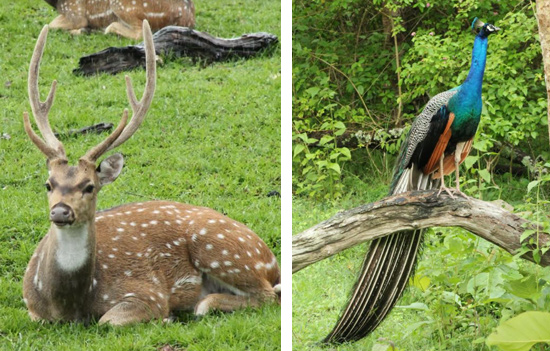 The chital deer and the peacock are common sight in these forests.
The chital deer and the peacock are common sight in these forests. 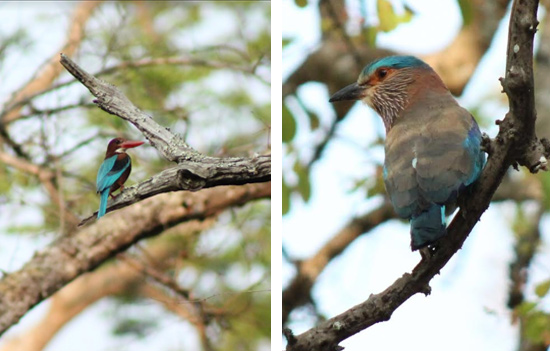 The white breasted kingfisher & the Indian Roller.
The white breasted kingfisher & the Indian Roller.Full caption - The white breasted kingfisher,
always a pretty sight in this part of South India and the Indian Roller,
Karnataka’s state bird. The Indian Roller turns prettier in flight, with
alternating light and dark blue patches on its wings.
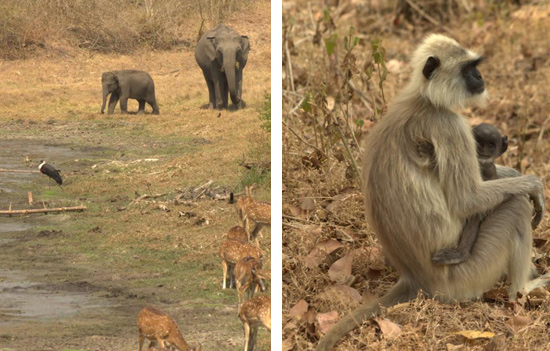 A stork, an elephant with its calf and chital deer flock to a watering hole; A baby langoor clings on to its mama.
A stork, an elephant with its calf and chital deer flock to a watering hole; A baby langoor clings on to its mama.The wild life in Bandipur is similar
to that in the Nagerhole forests, with a good count of predators and a strong
prey base. My encounters with the predators have been relatively few here,
compared to my experiences in the Nagerhole National Park, though I know of
many who have been luckier than me. I did chance upon a tiger in one of my
recent safaris, but that was probably after a dozen attempts. Leopards too have
been a rare sight, with only a few distant fleeting views.
However, the unpredictability of such
wild life sightings is what keeps you excited to get back every time. Speaking
of which, my best tiger sighting in Bandipur has not been while in an organized
jungle safari but at a time that I had expected it the least. It was after
spending one New Year’s Eve in the Emerald region near Ooty that I was driving
through Bandipur on my way back. One kilometre into the state of Karnataka
after crossing the forest check-post at the border, we were treated to a sight
that one dreams for a lifetime about – a full grown adult tiger crossing the
highway barely a hundred feet away from us. While the few vehicles on both
sides stood still as if in reverence, this royal form with streaks of orange,
black and white on its shining coat, moved across the windshield view and
disappeared into the bushes.
This chance encounter was all over
before we could gather our senses about us and get our camera firing. The best
we could manage were some quick phone clicks as we drove away. Dumbstruck as we
were with this unexpected stroke of luck, it reinforced the importance of
driving with caution on these roads through the forests. While an encounter of
this nature may be rare, it is common to find elephants, chital and sambhar
deer, langurs and gaurs on or very close to the road.
Even though you are on national or
state highways, specific rules apply when you are driving through the forests.
The rules are quite clearly indicated on roadside signs. In case you are not
forewarned on these, just remember a few basic ones. Do not over-speed and do
not stop for clicks even if you spot wild life on the sides of the road.
However, do slow down if you see any animal close to or on the road to avoid a
collision. The only time you stop is to allow animals to cross the road as they
have the right of way. Remember, the price for violating the rules of driving
on forest roads is pretty high, both in terms of prosecution by law and your
own safety.
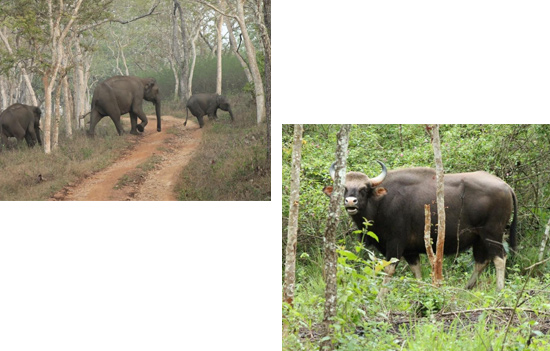 The jungle is their space, we are the intruders, so conduct yourself responsibly.
The jungle is their space, we are the intruders, so conduct yourself responsibly. 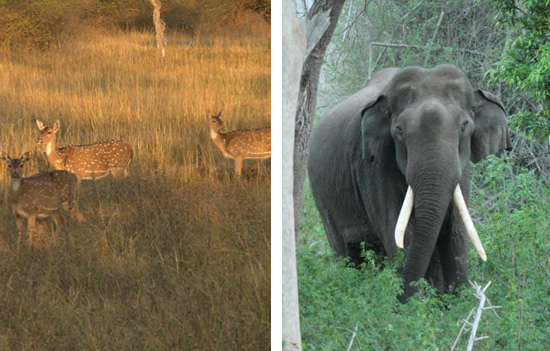 Chitals on the alert, and this tusker got too close for comfort.
Chitals on the alert, and this tusker got too close for comfort.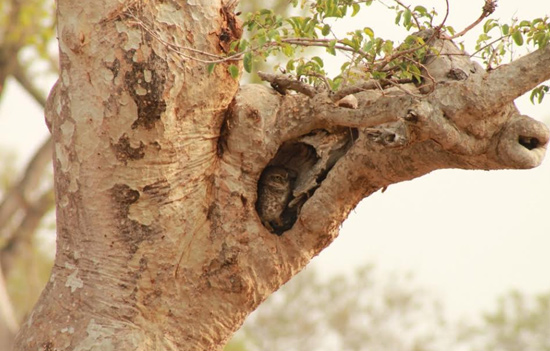 An owlet secures itself for the day.
An owlet secures itself for the day. Not much change is noticed as one moves into the Mudumalai Tiger Reserve after crossing the forest check posts of the two states. The typical mix of deciduous forests, evergreen forests and grasslands continue for some time, before you start noticing increased presence of moist deciduous vegetation and grasslands.
Different parts of the Mudumalai
National Park have different mix of vegetation, a result of the unequal
distribution of rainfall in the region, in turn caused by the adjoining Nilgiri
clusters. The images that I am sharing here are more from the Masinagudi side,
along the route that takes a shorter but steeper climb to Ooty.
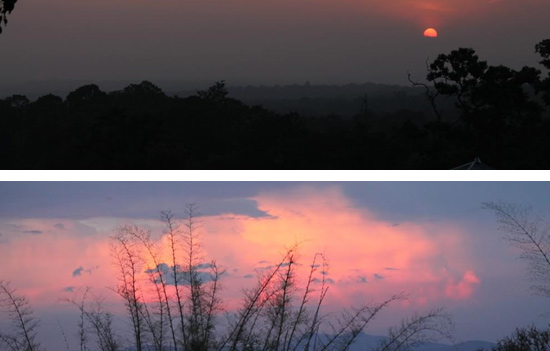 As the sun sets behind the hills, Mudumalai wakes up to the sounds of the jungle nightlife.
As the sun sets behind the hills, Mudumalai wakes up to the sounds of the jungle nightlife.An opportunity to stay well inside
the Mudumalai forests many years ago was a revelation of the sounds of the wild
at night. That was special, as a series of thunderous roars of a tiger,
alternating with elephants trumpeting in clear disapproval, shook the forests
and the bordering hills. These were indications of conflict between an elephant
herd and a tiger that might have been targeting a calf for its prey.
As the confrontation eased, the
jungle started to get back to normal, with the sounds of crickets, jungle fowl,
occasional alarm calls and the continuous rustling in the vegetation taking
over.
Masinagudi sets the tone of the
journey into the Nilgiris. As you leave Masinagudi behind, the road to Ooty
finds its way through exquisite undulating terrains that present different
views in changing seasons.
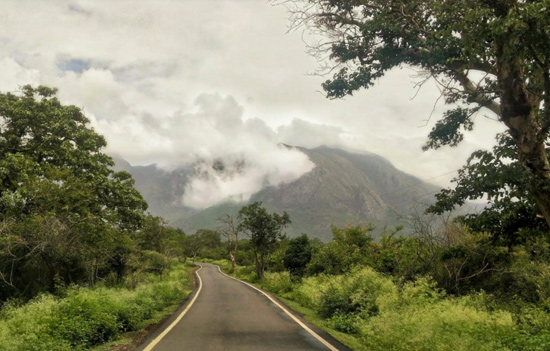 Every season offers its unique view of the same landscape.
Every season offers its unique view of the same landscape.Bandipur-Mudumalai-Masinagudi serve
as a fitting gateway to the marvels of the Nilgiris. In the posts to follow, I
shall take you to some more of the jewels that adorn the crown of the Nilgiri
biosphere. The region is treacherously poised on human development and a
diverse but sensitive ecosystem, and tourism tests its limits.
The greatest appreciation for these
southern wonderlands can come in the form of responsible tourism. So if you
like my posts and if you are fascinated by the Western Ghats and the Nilgiris,
make sure you place responsibility ahead of self- gratification as you tour
these lands.
Also read by author Nagerhole
National Park- A Jewel in the crown of Nilgiri Biosphere
To read all travelogues by author
Author is a Bengaluru
based professional.
To read all articles in India Travels and Yatras
section